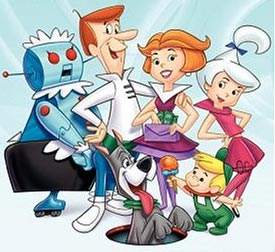Rosie is the mechanical servant from the animated situation comedy The Jetsons. She doesn’t get much back-story, but is a significant figure in the cartoon – and in our culture.
Throughout the long history of fiction, androids and gynoids – artificial men and women – have been a common element. When included as tertiary characters they are often symbols for “the other.” When treated as protagonists, they fill the tale with themes of the roles and definitions of humanity. Thus, this series is taking a close look at these artificial people. Today we’re looking at Rosie.

Rosie is the mechanical servant from the animated situation comedy The Jetsons. She doesn’t get much back-story, but is a significant figure in the cartoon – and in our culture.
The Jetsons purchased Rosie, second hand, from a Rent-A-Maid service, from which she was about to be retired as an obsolete model. She comes into their home to serve them as maid and nanny, showing a level of trust in robots rarely seen in literature.
She plays very little role in the original series – back in the 60’s – almost as if the writers really don’t understand what her place in the story is supposed to be. Like the dog, Rosie only really serves as comic relief.
Her comedic impact is heighted by being based on a character from another earlier sitcom. Her voice, and mannerisms are based on the Shirley Booth character, Hazel, which is itself based on a popular funny pages character by the same name.
Even Rosie’s tendency to call Mr. Jetson Mr. J, comes from Hazel’s insistence calling Mr. Baxter – her boss – Mr. B. Rosie’s name comes from another character, also a maid, from the same show. Just like Hazel, Rosie is shown to be the true head of the household on several occasions; however, she remains mostly just a sight gag for the closing credits until the show is revamped in the 80s.

In the new version of the show, the writes choose to make Rosie the family’s morality center, like Mr. Belvedere, or Charles in Charge. It becomes Rosie’s job to interpret and solve any problems which come up among the family members.
Usually this means adjudicating fights between the children, but occasionally she finds herself in the difficult position of taking sides in a fight between George and Jane Jetson, though she never seems to have any reservations about telling them that they are both morons.
As the series continues, this mediator role becomes more and more essential to the show, and Rosie begins to act more and more like her own character, starting to diverge from her roots as a simple parody of another show (having an audience which had mostly never heard of that other show probably contributed to that, but it’s also part of the natural progression of the narrative: Any character, no matter how derivative will eventually become more and more distinct from its source material).
One interesting thing to note here, is that, while it may be done mostly for comedic effect, Rosie does seem to be sentient. She has true opinions and independent thought, and even shows strong emotion on occasion (such as when she learns that one of her robotic friends has been decommissioned in a nearby workshop).
While the show never raises the issue, this may raise the question in some reader’s minds as to whether or not Rosie is a person, and whether The Jetsons have the right to purchase her as property, and have her keep their house clean with what basically amount to slave labor, even if she does seem to enjoy it.
Check back tomorrow, when we will conclude our series about artificial persons with a look at Astroboy.






